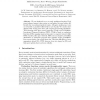Free Online Productivity Tools
i2Speak
i2Symbol
i2OCR
iTex2Img
iWeb2Print
iWeb2Shot
i2Type
iPdf2Split
iPdf2Merge
i2Bopomofo
i2Arabic
i2Style
i2Image
i2PDF
iLatex2Rtf
Sci2ools
117
click to vote
ICANN
1997
Springer
1997
Springer
On Learning Soccer Strategies
We use simulated soccer to study multiagent learning. Each team's players (agents) share action set and policy but may behave differently due to position-dependent inputs. All agents making up a team are rewarded or punished collectively in case of goals. We conduct simulations with varying team sizes, and compare two learning algorithms: TD-Q learning with linear neural networks (TD-Q) and Probabilistic Incremental Program Evolution (PIPE). TD-Q is based on evaluation functions (EFs) mapping input/action pairs to expected reward, while PIPE searches policy space directly. PIPE uses an adaptive probability distribution to synthesize programs that calculate action probabilities from current inputs. Our results show that TD-Q has di culties to learn appropriate shared EFs. PIPE, however, does not depend on EFs and nds good policies faster and more reliably.
Appropriate Shared Efs | ICANN 1997 | Neural Networks | PIPE Searches Policy | Probabilistic Incremental Program |
Related Content
| Added | 08 Aug 2010 |
| Updated | 08 Aug 2010 |
| Type | Conference |
| Year | 1997 |
| Where | ICANN |
| Authors | Rafal Salustowicz, Marco Wiering, Jürgen Schmidhuber |
Comments (0)

